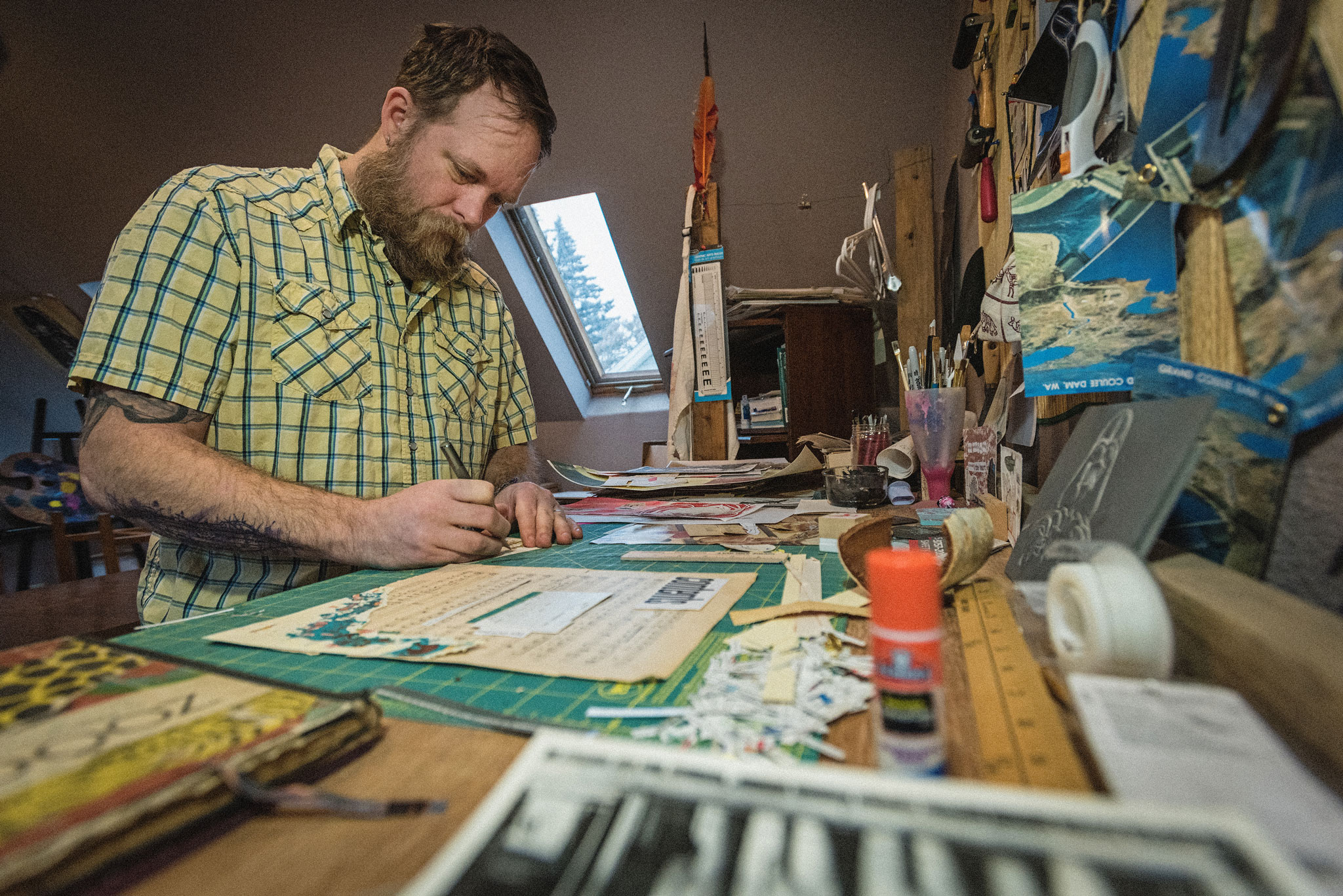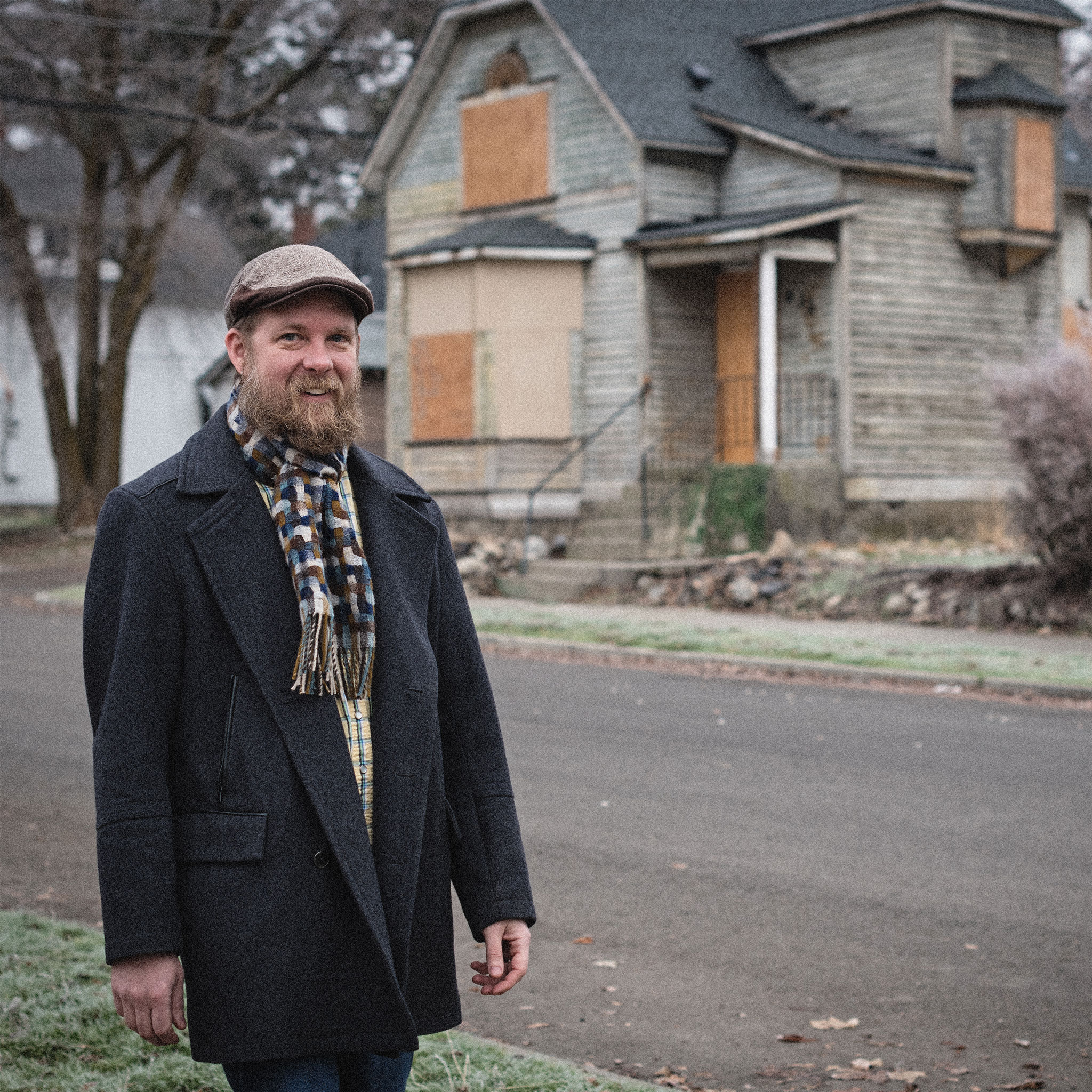Crafting a good life is much like a book in progress: character development over time, rough drafts, lots of revisions. Likewise, creating vibrant, close-knit communities requires good intentions, careful consideration and tangible action.Poet and Whitworth University Professor Thom Caraway, PhD., understands the hard work required for both book-making and community-building. He has done both, using his same literary tools and skills to seek common ground and promote the common good.
As Spokane’s first-ever poet laureate, Thom has made an indelible mark on the arts.
Thom’s quintessential intellectual artist look is a natural fi t — eyeglasses, thick beard, newsboy hat. Combined with his easy laughter and mellow demeanor, he’s unmistakable as an English professor.
Working for Whitworth since fall 2008, Thom, 45, is a hometown teacher, as an alumni of Shadle Park High School and Eastern Washington University. His roots in the community run deep.
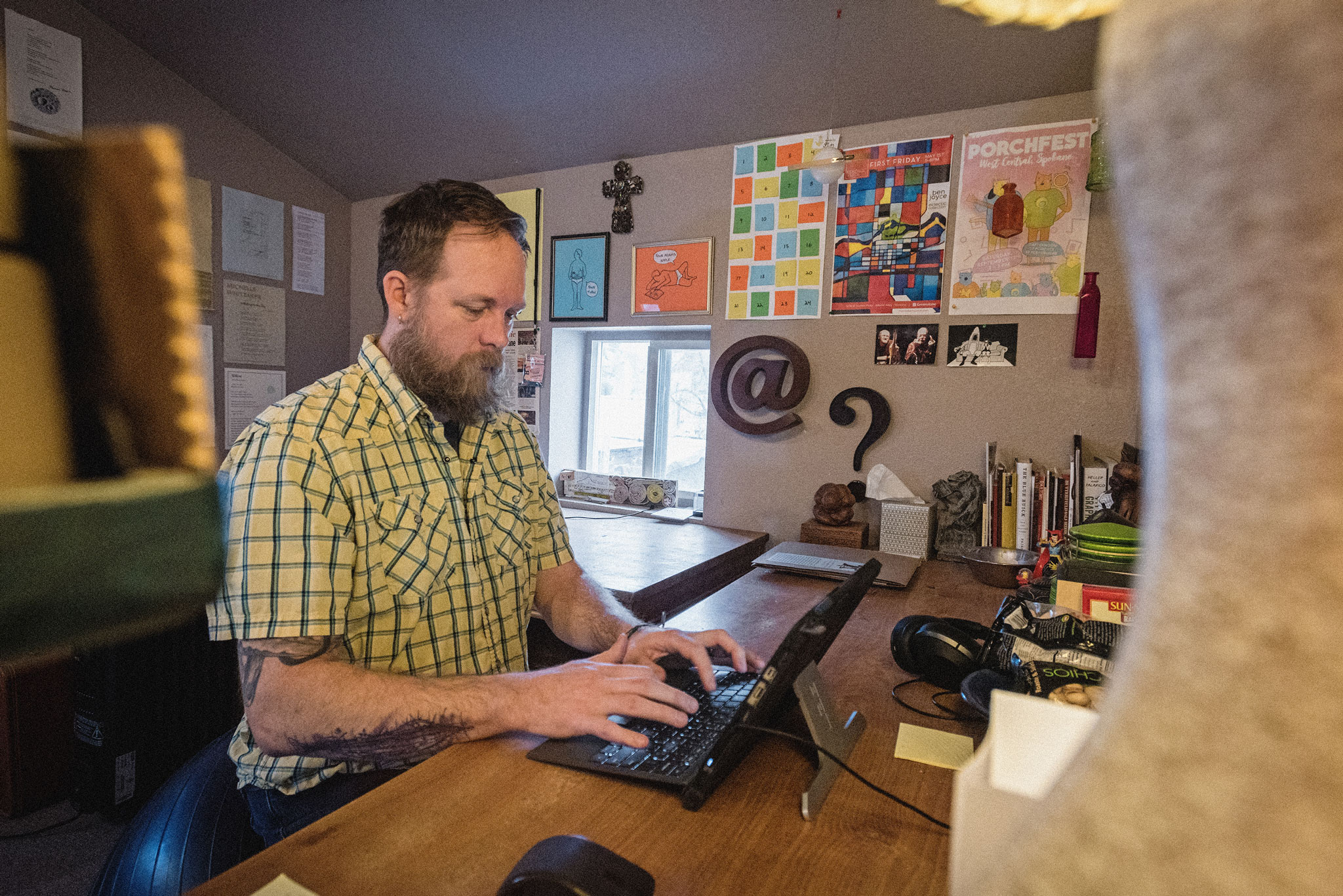
So when Spokane created its poet laureate program in 2013, in a city with a burgeoning literary arts scene and social circles of creative writers, Thom was chosen for this inaugural honor. At the time he wondered, “Does the community even know there are poets here?”
“To go from that kind of obscurity, to be asked what I could do here, felt incredible,” says Thom, who is also faculty editor for Whitworth’s literary magazine Rock & Sling. “All this [art-related] stuff was happening, and people were excited.”
As laureate, Thom was to design and oversee a community-wide poetry project, and soon his fingerprints were on artistic collaborations sprouting around the city.
He initiated Verbatim, a colla-borative art project that paired local visual artists and writers with the task to create something that included both a performance element and physical artwork for a gallery show, which took place in fall 2015. All the artwork was then sold, with proceeds donated to Ink Artspace — now incorporated as Spark Central.
Also as laureate, Thom published the Railtown Almanac poetry and prose anthology editions. As founder of Sage Hill Press — a non-profit created in 2004-05 — he already had the resources and experience. In collaboration with his friend and fellow poet Jeff Dodd, these two books featured local writers, of all ages and backgrounds, and “captured what was happening in Spokane at the time, with people who were writing about Spokane in different ways — a lasting record of what was happening in 2013-2015,” Thom says.
All 1,500 copies of the poetry anthology were sold, and the prose edition has only a few copies remaining.
“During my poet laureate gig, all these things that I did separately, to maintain sanity during that time period I had to make them go together,” he says. “That’s what I’ve tried to keep doing. Find ways to extend that ongoing sense of collaboration that I loved so much during my laureate years. That’s what I want for Spokane’s arts community — not to exist in isolation from each other. We all want the same sorts of things, and we can work in that direction together. And we can have some clout.”
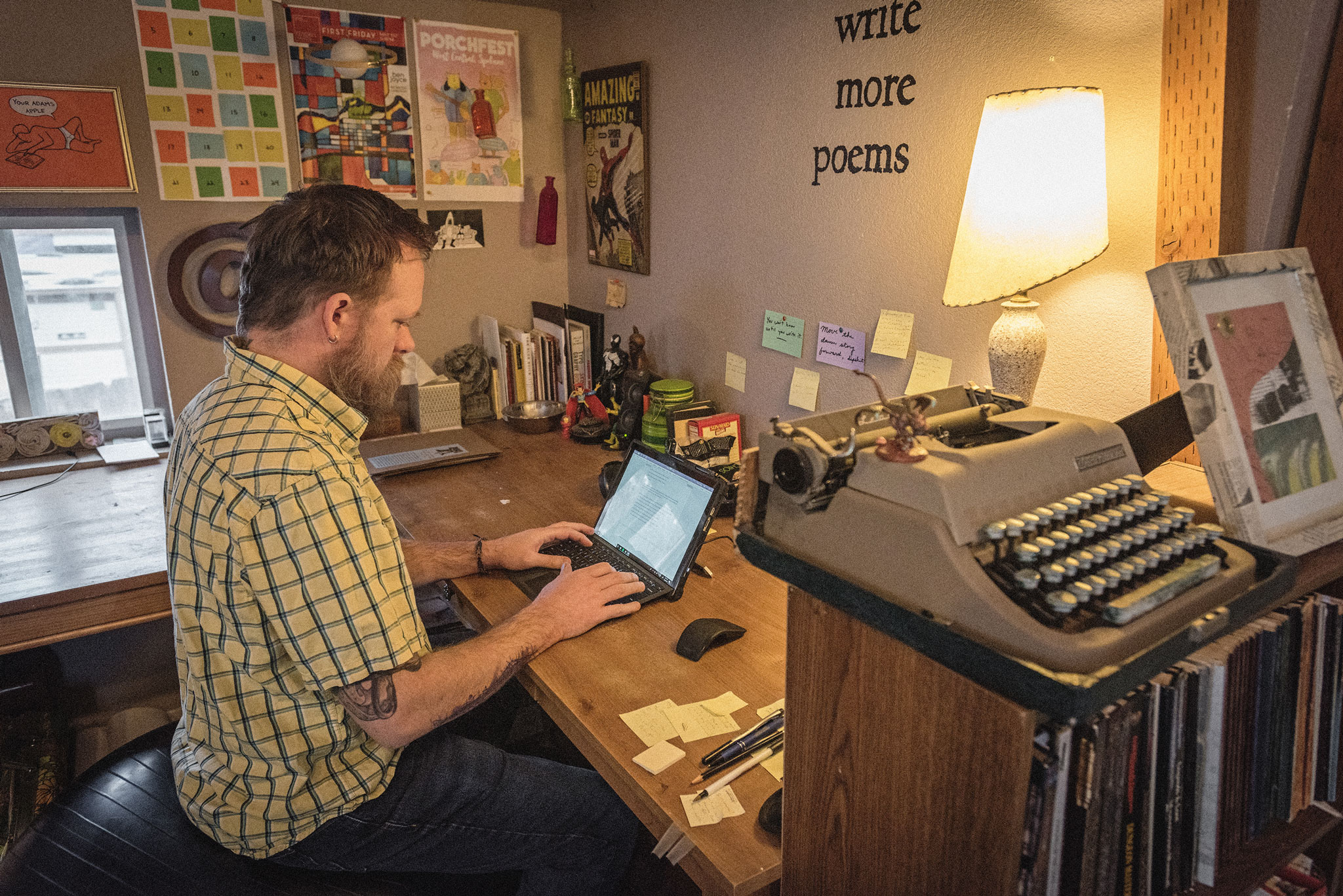
As an example of that collective power, he refers to what happened in spring 2016 when the artist community rallied together to write letters and testify to the Spokane City Council in support of increased funding for the arts. The city tripled funding from monies already being collected from hotel and entertainment taxes.
Thom’s indie press continues to be a platform for first-time published writers.
“Working with Thom and Sage Hill Press on my first collection of poetry has likely ruined me for working with all editors in the future,” says Ben Cartwright, recipient of Sage Hill’s Powder Horn Prize — awarded to a poet seeking first-time publication of a full-length manuscript. “What I mean by this is that I cannot imagine another editor being as thoughtful, invested, tough and welcoming as Thom. If collaboration could be someone’s default setting, that person would be Thom.”
Other poetry anthologies pub-lished by Sage Hill include: All We Can Hold, a collection focused on motherhood themes, co-edited by local poet Emily Gwinn; and Washington 129, by Tod Marshall, Washington State poet laureate (2016-2018) and Gonzaga professor.
Story continues after a quick message from our sponsor below.
Gwinn, who was also one of the poets who contributed to the first Verbatim event, says when she first sought Thom’s advice for her book idea, “He provided not only insightful suggestions on gathering material and communication with poets, but offered his press. He made the publication possible.”
Thom’s also co-founder and organizational director of Millwood Print Works, a non-profit inter-disciplinary community print shop. He teaches others how to use vintage letterpresses and completes his own visual art projects — reviving a hands-on skill that was historically revolutionary for book publishing.“Thom can create whatever he wants at the print shop, but his instinct is to use that platform to highlight the work of others,” says local poet and visual artist Kathryn Smith. “Both his press and Millwood Print Works let Thom use his skills to put the work of others in the forefront.”
Humble yet self-assured, Thom says, “I like being a cheerleader for the community, and connecting audiences, connecting artists to other artists and artists to audiences. Helping out where I can.”
And he enjoys community service, whether it’s reading his poems in public and helping organize events like PorchFest in his West Central neighborhood; volunteering with neighborhood church-based meal programs; hosting block parties to integrate neighbors from the Kendall Yards and West Central blocks of Bridge Ave; and organizing a weekly community barbecue at Dutch Jakes Park — along with friends from his church, Salem Lutheran — to feed neighbors and clean up the park.
“I would like to see us, as a Spokane community, move in an intentional way, anything that fosters arts incubation…[to show]that we take the arts as seriously as we take economic or technological development,” he says. “I would love for there to be some sort of utopian for artists, create space where artists could come and collaborate.”
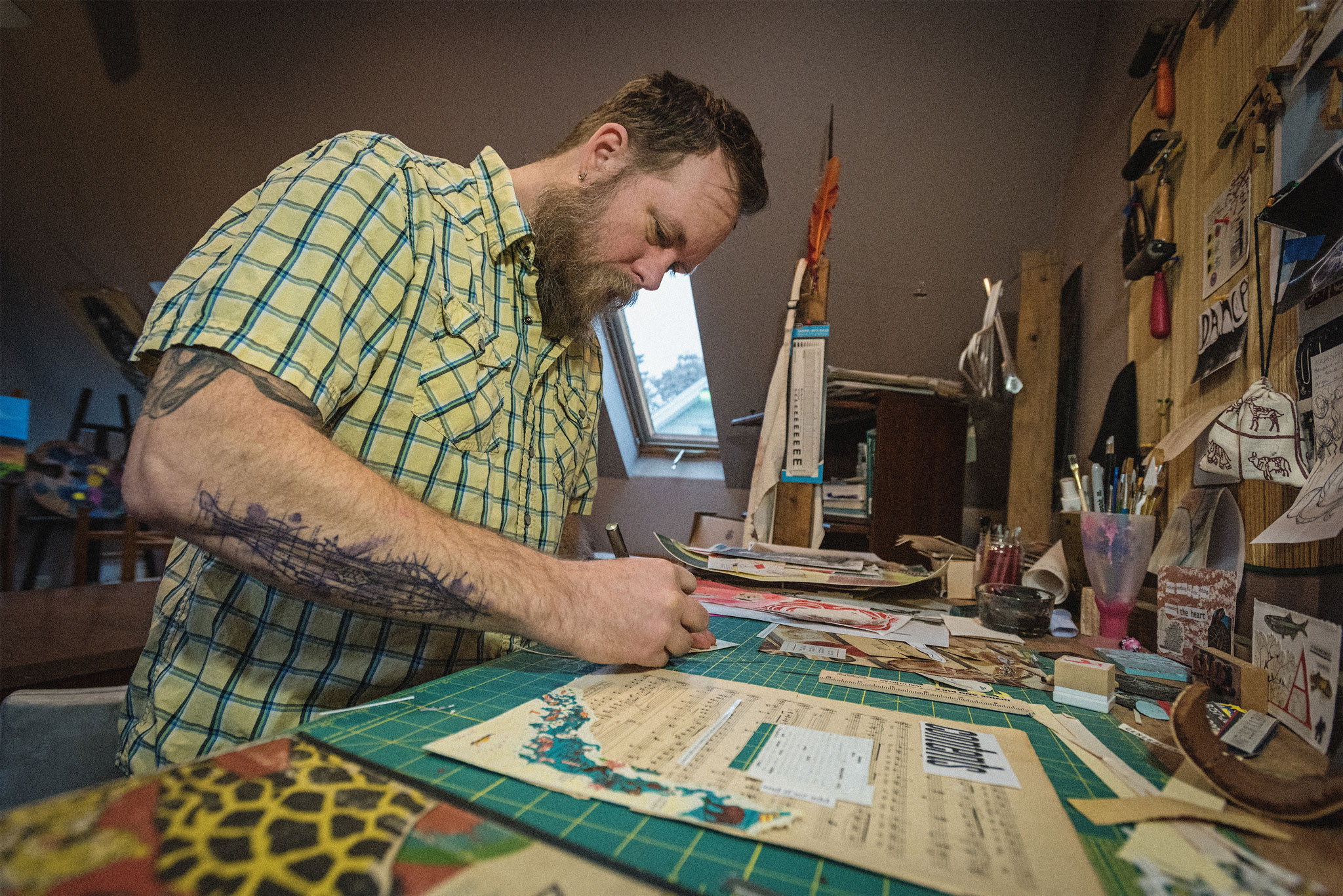
Thom envisions the potential of empty buildings, like the old bread-making warehouse in his neighborhood. He knows strong partnerships are essential for this big endeavor, which is why the city’s decision to invest more in the arts has been a game-changer.
“Having a vital arts scene creates energy. It doesn’t just keep people here, it brings people here. There’s also an economic impact — a $1 investment in the arts creates a $5.50 return for the community,” he says, citing research from the 2014 Arts & Economic Prosperity Study published by Americans for the Arts.
“Thom has consistently been a force for good. He’s someone who not only has great ideas but who is also willing to put in the work to actually make them happen,” says Melissa Huggins, executive director of Spokane Arts. “As the first-ever Spokane poet laureate, he set the bar incredibly high, laying groundwork that the next two poet laureates have been able to build on.”
Thom appreciates the accolades. He hopes in leading by example others will follow suit.
“If people know anything about me, what I hope that they know is that I’m trying to do something,” Thom says. “They might ask, what is he? Is he a printer, a poet, a publisher, a teacher, an editor? For me, all those things go together.
What I also hope is that people are encouraged to do things, too. Just because you’ve never done something, doesn’t mean you can’t learn.” N
By Amy McCaffree
Photography By Joel Riner
As Featured In: 2019 Winter/Spring SPO Edition
